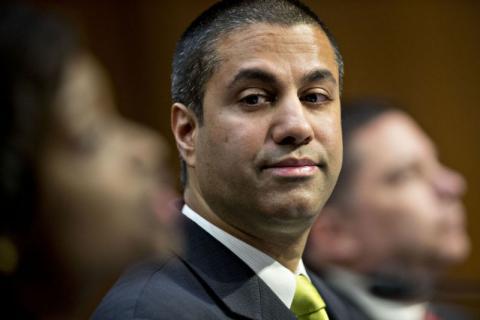Share
FCC Voted to Repeal Net Neutrality Rules

ACTION: Sign this ACLU petition
Ajit Pai, the FCC Chairman who is owned by the telecom and cable industry, followed through on their orders Thursday.
Federal regulators voted Thursday to allow Internet providers to speed up service for some apps and websites — and block or slow down others — in a decision repealing landmark, Obama-era regulations for broadband companies such as AT&T and Verizon. The move to deregulate the telecom and cable industry is a major setback for tech companies, consumer groups and Democrats who lobbied heavily against the decision.
Not only did they repeal net neutrality, but they essentially said their own organization, the FCC, should no longer have any authority over this topic. Wow.
The agency also went a step further, rejecting much of its own authority over broadband in a bid to stymie future FCC officials who might seek to regulate providers.
Named by Trump in January, Ajit Pai has been working every day since then to repeal rules that classify internet service as a utility. Under the Pai plan, high-speed internet service will no longer be treated like a public utility with strict rules, as it is now. Instead, he said, the industry "should largely be left to police itself.”
The clear winners of a repeal of net neutrality are the giant companies (Comcast, Verizon, etc) that provide internet access to phones and computers. The repeal will allow them to exert more control (ie charge more) over the online experiences of hundreds of millions of Americans.
Under the new plan, broadband providers will be able to block access, slow down or speed up service for its business partners in some cases — as long as they notify customers.
Big online companies like Google and Facebook say the repeal proposal would allow telecom companies to play favorites by charging customers for accessing some sites or by slowing speeds to others.
Small online companies believe the proposal would hurt innovation, because telecom companies could force them to pay more for the faster connections. Only the largest companies would be able to afford the expense of making sure their sites received preferred treatment..... consumers may see their costs go up if they want high-quality access to popular websites like Netflix, a company that depends on fast connections for its streaming videos. Netflix said on Tuesday that it opposed Mr. Pai’s proposal.
Large online companies such as Amazon, Netflix, Pinterest, and Etsy say the telecom companies will show favoritism to certain websites by charging them for normal access and slowing other sites. Netflix, for example, expects telecom companies to force them to pay hundreds of millions for internet access which will then be passed along to consumers meaning Netflix could easily double in price. Demanding millions (or billions) in "rent" from any popular website to keep their access to the public means sites like Netflix, at best can't invest in shows, and at worst stop existing.
FCC Commissioner Mignon Clyburn and Federal Trade Commissioner Terrell McSweeny opposed Pai's plan, saying it "would allow broadband providers to erect barriers or charge tolls to any application, connected device, or website that the broadband providers’ customers want to reach. It would allow broadband providers to favor their own content over others, and pick winners and losers on the internet."
Nothing would prevent the Comcasts of the world from creating new high-speed serving packages for your small business to force payment of hundreds more per month to keep your web site up. Comcast, AT&T, and others get to charge piles of money for services they are already providing. That money comes from our businesses and from every company we buy things from. Ultimately it comes from each of us.
Sources:
https://www.nytimes.com/2017/11/21/technology/fcc-net-neutrality.html
